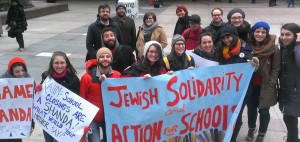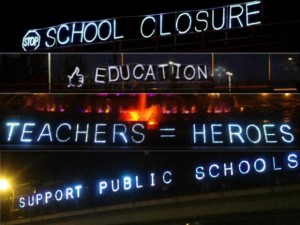Chicago's Young Jews Align Against Public School Shutdowns
Undeterred by today’s mass flooding, a delegation of young Jews heads to Mayor Rahm Emanuel’s office with a public letter against the shutdown of more than 50 public schools signed by a cross-section of Chicago’s Jewish community. The shutdowns, the Chicago Tribune reports, could “affect 30,000 students, almost all in kindergarten through eighth grade.” All this in a city that made national headlines with the Chicago Public School teachers’ strike in September, which challenged the public and media to take a closer look at the power of unions and public education in the United States.
As plans for this afternoon’s action took shape, I spoke with two of the organizers, Miriam Grossman, 26 (whom I’ve known since 2006, when we were both inhabiting the universe known as Oberlin College), and Wendy Mironov, 28. Here’s what they had to say about organizing, allyship, and how to cause a righteous ruckus.
Why this project at this particular time?
Miriam Grossman: Many of us are teachers and educators, some in Chicago Public Schools. We are graduate students and organizers. We are Jewish folks and others who believe education is a Jewish value and a human right. Mayor Rahm Emanuel and the CPS school board have proposed massive school closings throughout Chicago’s most struggling neighborhoods.
Partners in the Grassroots Education Movement (GEM), including Teachers for Social Justice, have shown these closings will be destabilizing in primarily black communities already underserved by the city. The fact that the city is cutting much-needed public services, especially for people of color, is discriminatory. As Jews, we care a lot about education, and we ought to have little tolerance for discrimination.
Together we decided that the proposed massive school closings stand in opposition to our Jewish values. We called ourselves Jewish Solidarity and Action for Schools because the balance between standing in solidarity and moving forward in action is critical for justice work and allyship.
Talk about your work with the closing and cutbacks in the Chicago Public Schools. What actions have you planned?
Miriam Grossman: The week that Chicago Public Schools announced the list of schools they planned to close, we joined the Grassroots Education Movement march against the closings in downtown Chicago. This was the second day of Pesach. A big hit was our sign that said “Rahm: School Closings are a shanda! What would your mother say?” That one generated a lot of laughs and cheers. Jokes aside, the real question was: where is the Jewish community, which has always cared deeply about education, when public schools — almost all in black communities — are being gutted?
We’ve also laid out the case for Jewish solidarity against discriminatory education cuts in our public letter to Mayor Emanuel and Barbara Byrd-Bennett, CEO of Chicago Public Schools. The best part of the letter is at the bottom, where the signatures are. You can see people who are rabbis or are involved, often heavily, in the Jewish community who clearly will not tolerate these discriminatory cuts. There are rabbis on that list who we look up to. It’s exciting to have them support our organizing, and it shows there is a will to have a broader conversation in the Jewish community, in synagogues and federations, about where we stand on equal rights and public services, in relation to our own history.
Some of those rabbis will be joining us to deliver our letter to Mayor Emanuel at his office on April 18, to make sure he hears the message. This is the day after CTU president Karen Lewis speaks on the school closures at Jewish Reconstructionist Congregation in Evanston.

Jill Zenoff
Miriam Grossman (center, white hat) and Wendy Mironov (second from right) talk about speaking “out as a Jewish voice against these attacks on our public education system.”
Tell me about the advent of JSAS and its relationship to the Chicago teachers’ strike.
Miriam Grossman: A small group of friends began meeting to talk about progressive and radical Jewish organizing for racial and economic justice in Chicago. The seeds of this idea were first planted on Rosh Hashanah and Yom Kippur. It was a new year. The Chicago Teachers Union was striking and igniting hope in new ways. In the months prior, the city had experienced terrible blows in the name of austerity, including the closure of half the city’s public mental health clinics. But with increasingly coalition work and the teachers standing strong, Rosh Hashanah and Yom Kippur felt like the precipice of something new in our city.
Together, as a new community, we began meeting for Havdalah. We marked the passage from Shabbat rest into creation by moving ourselves into action. Some of us had spent years talking about justice in Jewish spaces, and we wanted to move those conversations into action. We wanted to “pray with our feet.” For others, solidarity work had long been part of our lives, but we yearned to intersect justice work with Jewish community. And some of us first met through networks like the AVODAH Chicago alumni network and we wanted to keep growing our commitment to justice work.
Wendy Mironov: The Chicago Teachers Union strike was a huge factor in sparking the formation of JSAS, as well as in sparking a general movement to resist school closings in Chicago. Last year Chicago Public School successfully closed or turned around 17 schools with little pushback in the city. This year, in the wake of the successful teachers strike, and with the Chicago Teachers Union now leading efforts to resist school closings and working with a broad base of community organizations, Chicago is much better positioned to resist these attacks on our public education system. The success of the CTU strike provided inspiration and energy to fight the school closings. Many of us in JSAS supported the teachers during the strike. As details of the school closings began to emerge, particularly details around the targeting of schools in low-income communities with mostly African-American and Latino students, and the fact that CPS funds are being cut while banks and developers are getting tremendous financial support from the city, we felt that we had to come together and speak out as a Jewish voice against these attacks on our public education system.
Miriam Grossman lives in Chicago, where she studies interfaith engagement at the Chicago Theological Seminary. She has worked as the Chicago program director of AVODAH: The Jewish Service Corps and as a community organizer at the Jewish Council on Urban Affairs. Miriam has also been a student at SVARA, a yeshiva for “traditionally radical Judaism” and plans to go to rabbinical school.
Wendy Mironov is a nursing student and health educator in Chicago. She is active in the Jewish community as an alum of AVODAH and Moishe House Chicago, and as a Jewish Solidarity and Action for Schools member.
Chanel Dubofsky is the creator and editor of the Marriage Project. She has written for publications including Alternet, the Jewish Daily Forward, the Frisky, The Billfold, and Role/Reboot, and has worked for Pursue-Action for a Just World, Hillel, and the American Jewish World Service. She lives in Brooklyn.
![[the current issue of ZEEK]](../../image/2/100/0/5/uploads/leftistethicistgraphic-52842c6a.png)
- 5000 Pages of Zeek
- Founded in 2001, Zeek was the first Jewish online magazine, and we have over 5000 pages online to prove it, all available free of charge. Read more in the Archive.
More articles by
- We're on Hiatus!
- Euphoria, Curiosity, Exile & the Ongoing Journey of a Hasidic Rebel: A Q & A with Shulem Deen
- Purim’s Power: Despite the Consequences –The Jewish Push for LGBT Rights, Part 3
- Love Sustains: How My Everyday Practices Make My Everyday Activism Possible
- Poet Q, Poet A: Jews Are Funny! Six Poets on Jewish Humor, Poetry & Activism and Survival
More articles in


